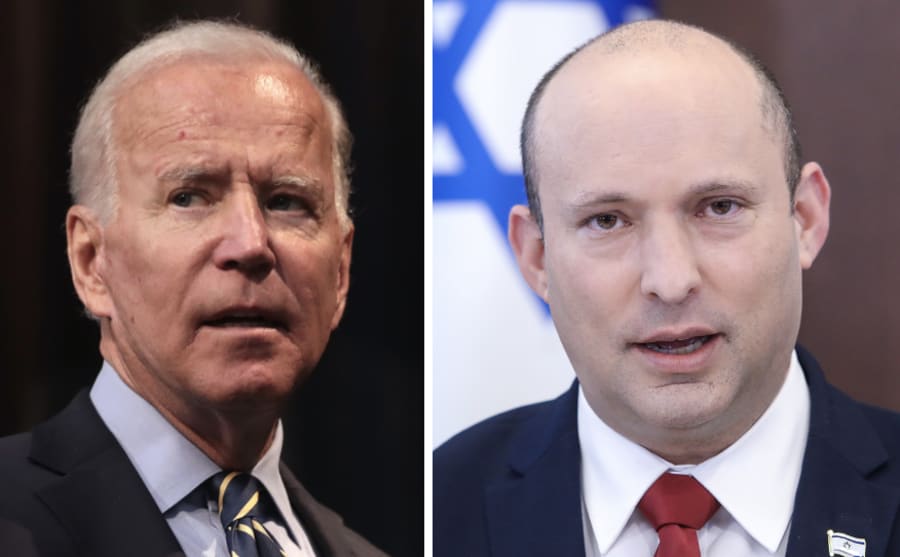BENNETT’S BIG TEST IN WASHINGTON
Sources close to new Israeli premier tell ALL ISRAEL NEWS the four objectives the PM hopes to accomplish on first meeting with Biden — can he pull it off?

WASHINGTON, D.C.—Naftali Bennett is facing the biggest test this week on the biggest stage of his life.
In talking to sources close to the new Israeli prime minister, I can report that Bennett has four specific objectives that he wants to accomplish in the roughly 48 hours he spends on the ground here in the capital of Israel’s closet friend and most important ally.
First, given that all politics is local, Bennett needs to convince Israeli citizens back home that he has what it takes to operate on the global stage and strengthen the U.S.-Israeli strategic alliance.
Yet he needs to do so at a time when President Joe Biden has just surrendered Afghanistan to the Taliban after the U.S. has invested 20 years, nearly 2,500 American servicemen’s lives and $2 trillion in liberating and stabilizing this Central Asian country.
Bennett needs to project strength and calm without stress or cockiness. If he looks weak or faltering, or young and unsure of himself, he is going to be excoriated back home, especially by former Prime Minister Benjamin Netanyahu, whom Bennett forced out of office.
Second, Bennett needs to convince Biden and his national security team that he is a friend they can work closely with, and that as a former defense minister he knows what he’s talking about when it comes to the Iran threat.
Specifically, Bennett needs to convince Biden that the Iranian nuclear project is now too far advanced to be effectively neutralized by a return to the Iranian nuclear deal known as the Joint Comprehensive Plan of Action, or JCPOA.
Third, Bennett needs to present Biden with a clear, compelling and comprehensive alternative strategy to neutralizing the Iranian nuclear and terror threat.
Not any old plan will do. It has to be one that Biden and his inner circle will find plausible, that they will not dismiss out of hand, a plan that gives them a realistic pathway forward – if Biden wants such a pathway, and especially in case the JCPOA 2.0 negotiations fail.
Fourth, Bennett needs to be scrupulously bipartisan – even nonpartisan – in his approach.
To be more specific, Republicans are already in full agreement with Bennett’s rejection of the JCPOA and belief the U.S. needs to get tougher with Iran, not appear weak.
What Bennett really needs to do is persuade Democrats in the White House, and on Capitol Hill, that he is a serious and capable leader that they ought to listen to and with whom they can build an effective partnership.
LIFE AFTER NETANYAHU?
“Bennett’s message to Biden is going to be that there is life after Netanyahu,” a current senior Israeli official in Jerusalem told me. “That Israel is stronger, new government is working better and able to overcome differences to cooperate on key issues.”
“He will say Iran is the major threat, and can’t be allowed a nuclear weapon, and that a return to the JCPOA would be a mistake,” the official continued.
Bennett will also make the case to Biden and his team that “the U.S.-Israeli alliance is unbreakable, that it outlasts any president and any prime minister, because it is built on deeply held shared values and critical mutual interests.”
AFGHANISTAN COMPLICATES EVERYTHING
Those are the objectives, but none of this is going to easy to do, to say the least.
Several senior Israeli officials, who spoke to me on condition of anonymity, made it clear that the crisis in Afghanistan has complicated everything.
Biden’s messy surrender to the Taliban has shocked and infuriated Americans and U.S. allies throughout Europe and the Middle East where leader's fears are high that Biden is trying to retreat from the region and that his promises can not be trusted.
Bennett is unlikely to confront Biden directly on Afghanistan, but the chaos in Kabul is like a dark storm cloud hanging over the White House talks regarding Iran.
Melody Sucharewicz, a former senior advisor to current Defense Minister Benny Gantz – and a member of the ALL ISRAEL NEWS advisory board – was willing to go on the record.
She told me that Bennett’s great challenge is navigating Biden’s devastating surrender of Afghanistan to a radical Islamist terrorist force.
“Appeasement of fundamentalist regimes deserves one label, and one label alone: the great American nation’s worst foreign policy mistake,” she said.
“Afghanistan shows how appeasement of fundamentalists ends: in chaos and terror,” Sucharewicz added.
“Appeasement of the Iranian regime [also] backfired. The influx of U.S. petro-dollars [into Iran] after the JCPOA was signed didn’t reach the Iranian people who are in desperate need of a functional economy,” she noted.
“Instead, the ayatollahs used the money to finance and expand the regime’s terror infrastructure – $700 million a year for Hezbollah alone – as well as nuclear-capable ballistic missile development and Iran’s nuclear weapons ambitions. Now, with [President] Ebrahim Raisi at the helm [in Tehran], what we’ll see is Iran’s regional terror campaign and nuclear bribery on steroids.”
Sucharewicz says the situation requires a “solid front between the U.S. and Europe, in close coordination with Israel, to confront the Iranian regime’s aggression, and pressure Iran back to the negotiating table from a position of strength.”
Can Bennett convince Biden to change course on Iran?
Can he convince Israelis that he – not Netanyahu – can forge a closer U.S.-Israeli alliance at a time when Democrats are in power on both ends of Pennsylvania Avenue?
At the same time, can Bennett also find a way to persuade Biden to build upon – rather than abandon or simply neglect – the historic and enormously positive Abraham Accords?
In short: Can Bennett forge a true working friendship with Israel’s most important ally to work against Israel’s most important enemies?
We shall see soon enough.
But one thing is clear: This week is an enormous test for the young Israeli leader – the biggest since he ousted Netanyahu, his mentor, from power.

Joel C. Rosenberg is the editor-in-chief of ALL ISRAEL NEWS and ALL ARAB NEWS and the President and CEO of Near East Media. A New York Times best-selling author, Middle East analyst, and Evangelical leader, he lives in Jerusalem with his wife and sons.














